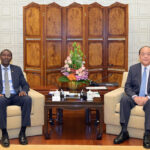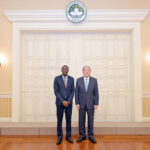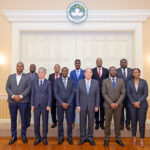 The Chief Executive, Mr Ho Iat Seng, meets with Vice President of the National Assembly of the Democratic Republic of São Tomé and Príncipe, Mr Abnildo do Nascimento D'Oliveira, at the Government Headquarters in Macao.
The Chief Executive, Mr Ho Iat Seng, meets with Vice President of the National Assembly of the Democratic Republic of São Tomé and Príncipe, Mr Abnildo do Nascimento D'Oliveira, at the Government Headquarters in Macao.
The Chief Executive, Mr Ho Iat Seng, today met with Vice President of the National Assembly of the Democratic Republic of São Tomé and Príncipe, Mr Abnildo do Nascimento D'Oliveira. The two sides exchanged views on education and tourism training.
The Chief Executive expressed gratitude to Vice President of the National Assembly Mr D'Oliveira and his delegation for making the long journey to attend the 6th Ministerial Conference of the Forum for Economic and Trade Co-operation between China and Portuguese-speaking Countries (Macao), the latter a body known as Forum Macao.
Gathering in Macao for this edition of the Ministerial Conference meant all participants had the opportunity to gain further insights into the latest development opportunities in São Tomé and Príncipe. The country had beautiful natural landscapes, making it a suitable location for tourism. Macao possessed its own unique tourism resources, and the local tourism industry had seen significant progress. Both places could strengthen exchanges and cooperation in this regard.
The Macao Special Administrative Region (MSAR) Government were willing to provide tourism training for São Tomé and Príncipe, supporting development of its local industry. Macao could also deepen cooperation with São Tomé and Príncipe in areas such as human resources and police training, especially in assisting in promoting smart policing initiatives.
The Chief Executive mentioned that Macao’s traditional Chinese medicine industry had a solid foundation. In the future, greater efforts would be made to explore the markets of Portuguese-speaking countries, including São Tomé and Príncipe, and export high-quality Chinese medicine products. In addition to enhancing the health of the local population, such efforts also helped promote the internationalisation of traditional Chinese medicine.
Mr D'Oliveira expressed his gratitude to the MSAR Government for the warm hospitality during his delegation’s visit to Macao. Mr D'Oliveira pointed out that this year's Ministerial Conference of Forum Macao helped further the friendly relations between São Tomé and Príncipe and China, and other Portuguese-speaking countries, and to broaden the scope of economic and trade cooperation among all parties of Forum Macao.
He believed that Macao would continue to play a pivotal role as a platform, providing even greater assistance for enterprises from Portuguese-speaking countries to enter the Chinese market. It was hoped that mainland China and Macao businesses would invest in key industries such as tourism, agriculture, and renewable energy, thereby opening up new growth points for São Tomé and Príncipe's economic development.
Mr D'Oliveira highlighted the importance of talent training, expressing gratitude to the MSAR Government for the support rendered over the years enabling young people from São Tomé and Príncipe to receive training in Macao. He hoped the two sides would further strengthen cooperation, via effective framework under Forum Macao, promote cultural exchanges, and foster economic development. He agreed that São Tomé and Príncipe and other Portuguese-speaking countries would introduce greater number of high-quality traditional Chinese medicine.
The Secretary for Administration and Justice of the MSAR, Mr Cheong Weng Chon; the Minister of Economy of São Tomé and Príncipe, Mr Disney Leite Ramos; and the Ambassador of São Tomé and Príncipe to China, Ms Isabel Domingos, were present at the meeting.




